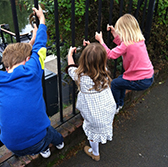
Genuine hope, unlike false hope, is a trusted steadfast belief, strengthened by the part of us that cares, that we will find a way to face things truthfully, even when this brings difficult feelings and moral challenges, and even when we find ourselves stuck at times. Here is a personal example of my struggle to do this.
CLIMATE PSYCHOLOGY ALLIANCE CONFERENCE: RADICAL HOPE AND CULTURAL TRANGEDY
Hope resides in mending the human heart and mind
Short version of introduction to workshop
Folk House, Bristol
Genuine hope, unlike false hope, is a trusted steadfast belief, strengthened by the part of us that cares, that we will find a way to face things truthfully, even when this brings difficult feelings and moral challenges, and even when we find ourselves stuck at times. Here is a personal example.
During an enjoyable evening with friends I said we had recently lit a bonfire. One friend said, “what about the carbon?” I lost my temper with him. He knows I struggle to keep my personal emissions down. These friends had just talked of their plans to fly long distance on holiday. I had not lost my temper in this kind of way over any carbon conversation before.
I said how come I was required to account for my emissions, even small ones, and not them; that I never challenged them on their personal carbon choices and I felt he’d put me under a spotlight they avoided. He said yes indeed, but he was teasing me. He conveyed he thought I’d lost my sense of humour. This was true, but I felt his teasing came from a place embedded in cultural complacency and disavowal about the seriousness of climate change.
I asked him what he thought about the current climate situation. He thought the situation was hopeless. He said perhaps he was in disavowal, but he would be carrying on with life as usual. Perhaps I was suffering from major disappointment that people were not changing. He asked could we continue the conversation later? Maybe I could face my disappointment more and he could become more engaged about climate change?
He was spot on about the unacknowledged force of my disappointment. It had been slowly building up as a result of many interchanges with different friends. I had hoped they would step up more, fight for change, and be more reflective and responsible about their carbon choices.
Facing my disappointment brought huge sadness. Was I mourning an illusion that people could change for the better, had my hopes for change been Pollyannaish, or was I simply more emotionally in touch with my feelings about our culture of uncare?[i] I did not know. But with my anger having abated and given way to sadness and grieving my sense of hope began to resurface.
I felt more open to what will happen for better or worse and more aware I do not know what will happen. I felt a new freedom to talk about climate change in social situations and more open to people’s views, particularly those I disagree with.
This and many other interactions with friends led me to reflect on my own disavowal. I think I had been underestimating the force of our culture of uncare to influence how people collectively think, and this despite my intellectual awareness of its force. Here I felt its force more, and this left me full of anger that gave way to grief.
I think when I feel without hope I am in the state described by psychoanalyst Hanna Segal[ii] :
“When the world within us is destroyed, when it is dead and loveless, when our loved ones are in fragments, and we ourselves in helpless despair”.
She also said, “it is then that we must recreate our world anew, reassemble the pieces, infuse life into dead fragments, recreate life.”
Recreating my inner world and with it my sense of hope involved my mourning illusion and accepting reality. It also involved confronting my own disavowal. Had I needed my friends to change so I could feel better? If so, that would be a magical ‘quick fix’ to stave off my need to grieve.
I had eclipsed a more generous part of me that could let go, grieve, tolerate people’s otherness, give them more credit and be open to what might happen. This caring part had become a dead and loveless fragment.
Hope comes with accepting reality and mourning illusion. In this process hope itself becomes altered. Martin Luther King[iii] talked of turning a mountain of despair into a small stone of hope. With my anger, frustration and then despair having given way to grief, my sense of hope, and I, felt harder and flintier, more stone-like, but in a good and serviceable way. My will felt strengthened. Things felt more repaired in a genuine way in my inner world.
Hope is fed by keeping faith we can relate to something good within us. This sustains our will to face reality. This relating involves hard, ongoing, felt work.
[i] See Weintrobe (2014) The culture of uncare. Bob Gosling Memorial Lecture, Bridge Foundation for Psychotherapy and the Arts.
[ii]Segal, H. (2006). SEPTEMBER 11. Psychoanal. Psychother., 20:115-121
[iii] Martin Luther Kings’ ‘I have a dream’ speech.